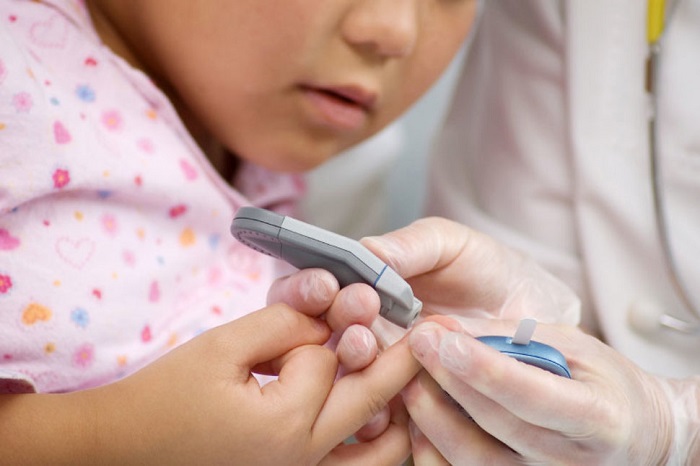Be Smart: Keep Kids’ Hearts Healthy From the Start

Type 2 diabetes accounts for about 90 percent of diabetes cases. (Getty Images)
Diabetes, obesity and heart disease are on the rise. More Americans are overweight. Increasing obesity in the U.S. correlates with increasing diabetes rates, which then correlates with increasing rates of heart disease and cardiomyopathy – a disease of the heart muscle. America's children are in long-term danger of higher stroke, heart failure and heart attack risks. Prevention and daily lifestyle improvements need to start early and be implemented by society to prevent these diseases for the next generation.
We will discuss the diseases that children are at risk for developing and address initiatives being enacted for prevention.
Diabetes the Devil
Diabetes negatively impacts your body's processing of blood sugar. This sugar, glucose, is a main energy source and a fuel for your body, especially for your brain. There are two types of chronic diabetes, Type 1 and Type 2. Both result in heightened blood sugar levels. There's also gestational diabetes, which occurs in pregnant women, and prediabetes, when your blood sugar is somewhat elevated (110 to 124 milligrams per deciliter). Prediabetes may be improved with exercise and good diet, whereas giving birth may resolve gestational diabetes. Prediabetes often leads to Type 2 diabetes unless the person improves their lifestyle habits.
In Type 1 diabetes, the immune system attacks insulin-producing cells in the pancreas, which results in the body lacking insulin. Without sufficient insulin to signal cells to take in glucose, sugar builds up in the bloodstream. Symptoms of Type 1 diabetes include increased thirst, frequent urination, unexplained weight loss, extreme hunger, ketones in the urine, blurred vision, irritability, fatigue, frequent infections and slow-healing sores. Type 1 diabetes is believed to be caused by a combination of genetic and environmental factors. It can develop at any age, but it develops most often in childhood.
Type 2 diabetes is the preventable form that we will focus on. It's the more common type (approximately 90 percent of diabetes) and can occur at any age. It most often occurs in people older than age 40, but alarmingly it is now affecting many children. Type 2 diabetes and prediabetes occur when your cells become resistant to insulin and the pancreas is unable to produce enough insulin to compensate. Insulin is released when blood sugar levels are high and is responsible for causing them to drop by circulating and allowing glucose to enter into cells from the bloodstream. Both prediabetes and Type 2 diabetes are, like Type 1, believed to be caused by genetic and environmental factors. However, being overweight or obese is strongly linked to developing type 2 diabetes.
The more fat you have, the more inactive and older you are, the higher your LDL cholesterol or "bad cholesterol," triglycerides and blood pressure, the more at risk you are for developing Type 2 diabetes. There is a laundry list of complications from diabetes, but we're focusing on one of the most fatal that damages your ticker: heart disease.
Cardiomyopathy the Killer
Cardiomyopathy is a group of diseases that afflicts the heart muscle, in which the heart muscle thickens, stiffens and/or weakens and therefore struggles to deliver adequate oxygenated blood to the body. There are various types of cardiomyopathy including ischemic, hypertrophic, dilated, Takotsubo, restrictive cardiomyopathy and arrhythmogenic right ventricular dysplasia. Diabetes can lead to cardiomyopathy by contributing to plaque buildup in the coronary arteries of the heart, which in turn progressively blocks blood flow to the heart muscle and causes an ischemic cardiomyopathy. Additionally, even without such a severe restriction in blood flow, individuals with diabetes may have cardiomyopathy as a result of the high blood sugar and abnormal metabolism.
Symptoms of cardiomyopathy may not be present at first, but eventually include arrhythmia, fainting, dizziness, shortness of breath, fatigue and swelling of the legs and belly. Cardiomyopathy is either acquired, meaning it results from another condition, or it's inherited. Some of the conditions that cause cardiomyopathy are long-term high blood pressure, chronic rapid heart rate, obesity, diabetes and nutritional deficiencies, among others. Complications from cardiomyopathy include heart failure, valve problems, blood clots, cardiac arrest and sudden cardiac death.
Legislation to the Rescue
In addition to clinical care, research and education, responsible legislation could help curb heart disease risk starting in U.S. youth. In Baltimore, for example, the Kids' Meal bill was just signed into law by Mayor Catherine Pugh. It requires food service facilities offering beverages as a part of a packaged children's meal to limit the beverage offerings to healthy options: water, milk or 100 percent fruit juice. This legislation will help make the healthier choice an easier choice, while protecting freedom to choose. Hopefully, more efforts like this one will be enacted nationwide in an effort to shield children from unhealthy food and beverages while simultaneously maintaining options.
Story Credit: https://health.usnews.com/health-care/for-better/articles/2018-09-04/be-smart-keep-kids-hearts-healthy-from-the-start
Since you’re here, we have a small favor to ask. Requests from schools and districts for our screening services are growing, which means that the need for funds to cover the cost of those services is also growing. We want to make our services available to those who request it and beyond, so you can see why we need your help. Safebeat heart screenings take a lot of time, money, and hard work to produce but we do it because we understand the value of a child's life, PRICELESS!
If everyone who reads this likes it and helps fund it, our future would be more secure. For as little as $1, you can support Safebeat and it only takes a minute. Make a contribution. -The SafeBeat Team


